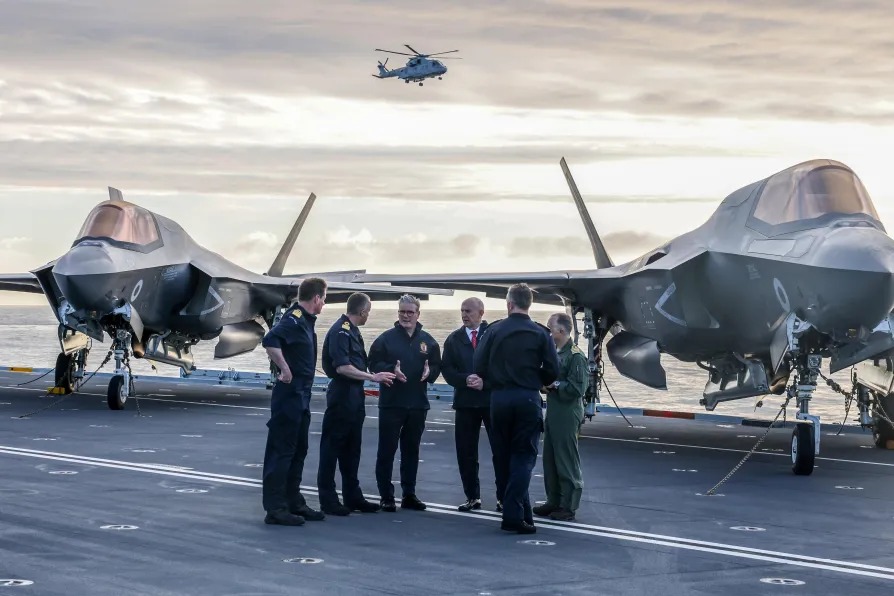
 Prime Minister Keir Starmer (third left) and Defence Secretary John Healy (third right) talk with naval officers on the flight deck of HMS Prince of Wales, the Royal Navy's flagship aircraft carrier, in Plymouth, Devon, April 24, 2025
Prime Minister Keir Starmer (third left) and Defence Secretary John Healy (third right) talk with naval officers on the flight deck of HMS Prince of Wales, the Royal Navy's flagship aircraft carrier, in Plymouth, Devon, April 24, 2025
IT IS good news that the US government is reviewing the Aukus pact initialed between Britain, Australia and Washington in 2021.
The deal provides for a major escalation of the arms race in the Pacific and is a cornerstone of imperialist plans to challenge China in its own waters.
Under its provisions, a new range of nuclear-powered submarines are to be provided to Australia, initially from existing US stock and then, in part, from British shipyards.
British and US submarines will also be based in Perth, Western Australia, according to the deal.
The Trump administration is surely not animated by peace-loving principles in examining whether to row back on this major escalation in the arms race.
In fact, the US seems to have two major reservations about the pact. The first is whether it can afford to sell Australia the nuclear submarines mandated under the agreement.
Some in the Pentagon argue that they are needed for the US’s own purposes, mainly confronting China.
Second, the Trump high command is uncertain as to whether the submarines, including those to be built new in Britain and Australia, will necessarily be deployed in line with “America First” requirements if push comes to shove. Moreover, transferring cutting-edge strategic technology could be risky.
In short, the US wants direct control of its own military assets the better to serve its own purposes, without haggling with tiresome allies.
In a rational world, Britain would never have been a signatory to the deal. The country has no conceivable security interests in the Pacific — indeed, the Pentagon is believed to have told the Labour government to focus its military efforts exclusively on Europe.
Yet Sir Keir Starmer, following in Tory footsteps, is dispatching one of the navy’s two aircraft carriers to the Far East in a display of anti-China provocation.
Some might view this as simple vainglory on the part of an Establishment unreconciled, even after generations, to no longer ruling the waves.
In fact, it is testament to the continuing reactionary role played by British imperialism across the world — subordinate to the US, for sure, but independently aggressive.
That can be seen in the Persian Gulf today, with the navy joining in the assault on Yemen, and in the heavy British interference in Ukraine, both without the remotest “national security” justification.
What the British ruling class means by national security is in reality the smooth and unchallenged operation of the global capitalist system, which in turn requires a military police role.
With the US presently showing some reluctance to act outside of its own most narrowly conceived interests the danger is Britain will be tempted to do still more “heavy lifting” to maintain the faltering world order itself.
Certainly, Starmer and Chancellor Rachel Reeves have put aside the funds to do so, at the expense of welfare, action on child poverty and green industrial investment.
As so often in the past, the British people themselves are paying the price for imperialism.
That is, of course, as nothing compared to the price that will be paid if reckless deals like the Aukus pact end up triggering major conflicts.
The government claims it is acting defensively, and exclusively in the interests of “peace and stability.”
That is as bogus as previous governments’ claims that British interventions were altruistic acts designed to spread the benefits of bourgeois civilisation, that conflicts were necessary to halt the spread of communism in places where that movement was barely extant, down to Tony Blair’s invocations of humanitarian motives for aggression and slaughter.
Perhaps Trump will pull the plug on the Aukus scam. If he doesn’t, we should.










